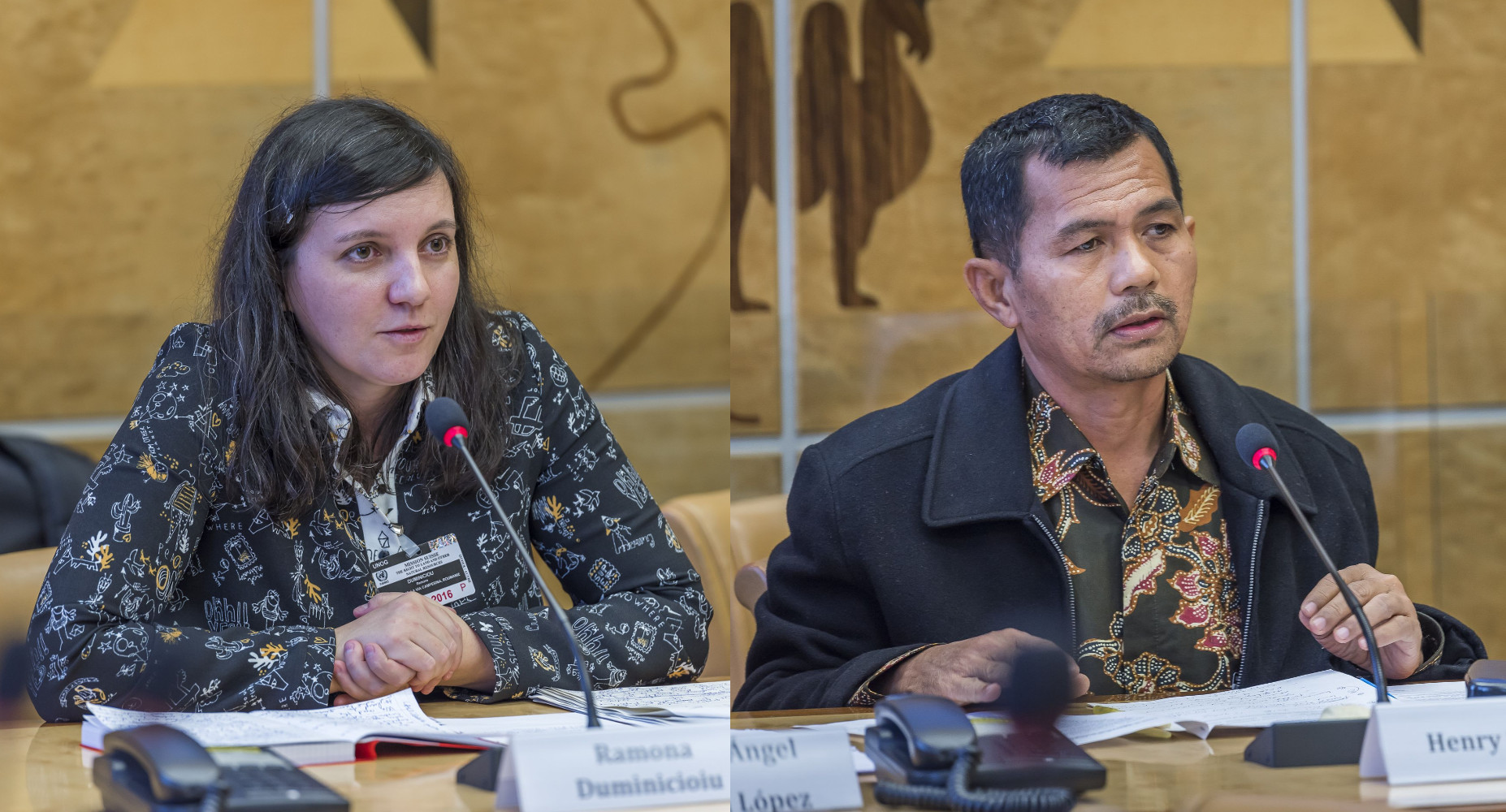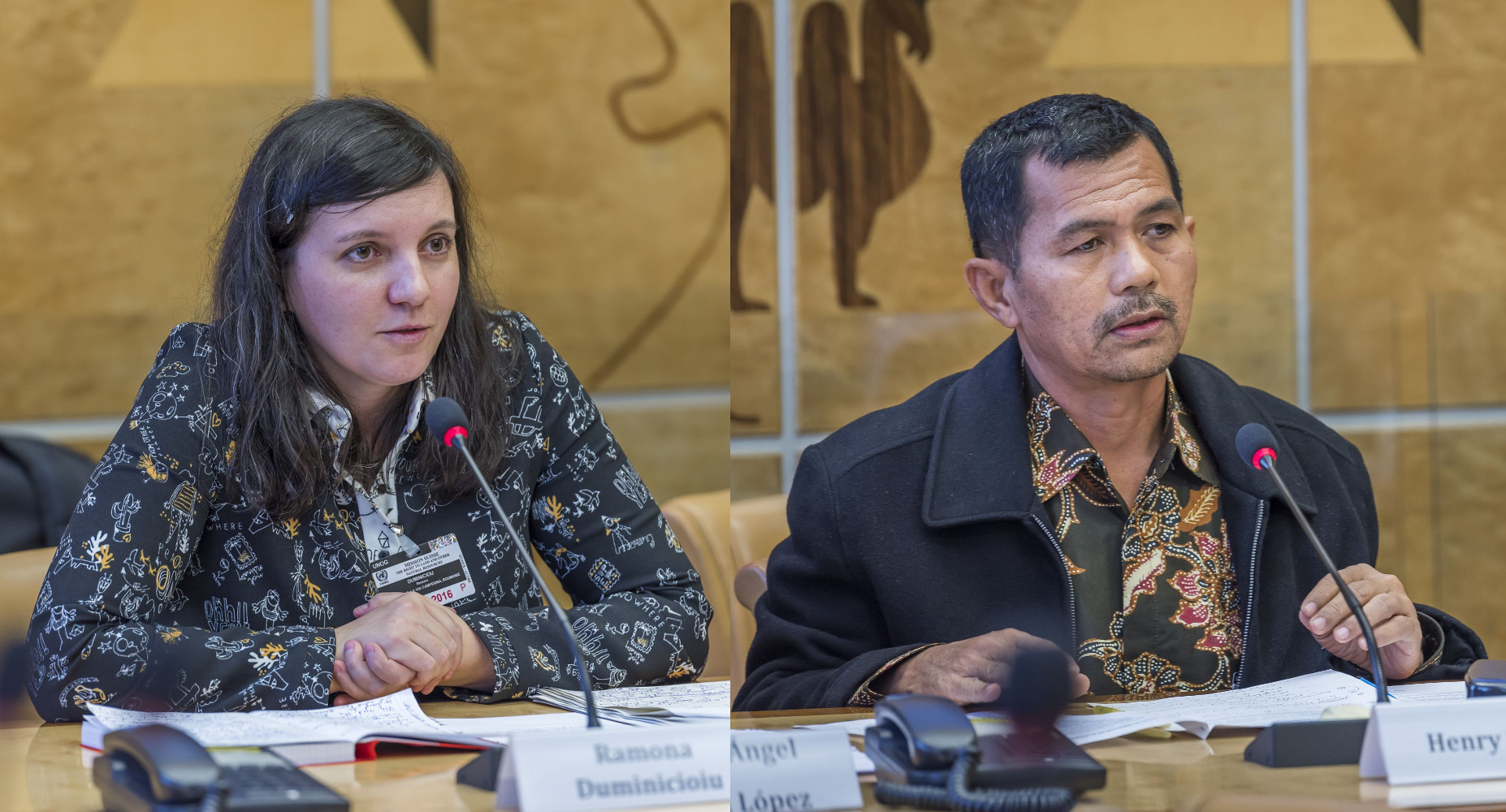 Brussels, December 6, 2016
Brussels, December 6, 2016
La Via Campesina speaks for the Right to Land and other Natural Resources in the process of the United Nations Declaration on the Rights of Peasants and other People Working in Rural Areas
On the 17 November 2016, Henry Saragih (Serikat Petani – Indonesia, La Via Campesina) and Ramona Duminicioiu (Eco Ruralis – Romania, European Coordination Via Campesina) spoke at the Palais des Nations in Geneva about the reasons why the Right to Land and other Natural Resources is crucial for the Declaration of the Rights of Peasants.
The two Via Campesina’s spokespeople participated in an Expert Seminar organized by the Bolivian and Swiss Governments together with the Geneva Academy.
The purpose of the Seminar was to bring supporting arguments for governments to understand the necessity of the Right to Land to be recognized as a Human Right in the UN Declaration on the Rights of Peasants […].
The Seminar had a consistent participation of states representatives, including the permanent missions of Colombia, Switzerland, France, Algeria, Slovakia, Bolivia, Portugal, Tchad, Indonesia and others, as well as global food and human rights related institutions, civil society and academia.
This seminar was a step forward in the process which started 15 years ago. The current draft Declaration is under negotiation with the Open-Ended Intergovernmental Working Group (OEIWG) on the rights of peasants and other people working in rural areas. This Working Group is part of the Human Rights Council in Geneva and was created in September 2012 by Resolution 21/19.
“Tens of millions of peasants from Europe need to have their rights respected. No current legislation protects peasants against land grabbing. We need this process in Geneva and our Governments and the European Union should defend it and work with us.” declares Ramona Duminicioiu, from the European Coordination Via Campesina.
“There can be no Declaration on the Rights of Peasants without the right to land. This is one of the most essential articles. The Right of Peasants to Land is essential for the young generations to come, not just for the Global South, but also for the North. Peasants from all around Asia struggle for their right to land and it’s time for our Governments to support us in this process.” adds Henry Saragih, from La Via Campesina.
A comprehensive article on the process can be found here : ‘Over 15 years’ struggle for the recognition of peasants in the international human rights system’
Article 19 of the Draft UN Declaration on the Rights of Peasants and Other People Working in Rural Areas (27.01.2015)
Article 19 – Right to Land and other Natural Resources
1. Peasants and other people living in rural areas have the right, individually or collectively , to the lands, water bodies, coastal seas, fisheries, pastures and forests which they need in order to make from them an adequate standard of living, to have a place to live in security, peace and dignity and to develop their cultures. [1]
2. States shall remove and prohibit all forms of discrimination related to land tenure rights, including those resulting from change of marital status, lack of legal capacity, and lack of access to economic resources. In particular, States shall ensure equal tenure rights for women and men, including the right to inherit and bequeath these rights. [2]
3. States shall provide legal recognition for land tenure rights, including customary land tenure rights, not currently protected by law. All forms of tenure, including tenancy, must provide all persons with a degree of tenure security which guarantees legal protection against forced evictions. [3] States shall recognize and protect the natural commons and their related systems of collective use and management. [4]
4. Peasants and other people working in rural areas have the right to be protected against being arbitrarily displaced from their lands and other natural resources or place of habitual residence. [5] States shall incorporate protections against displacement into domestic legislation, consistent with international human rights and humanitarian law standards. [6] States shall prohibit forced eviction, demolition of houses, destruction of agricultural areas and the arbitrary confiscation or expropriation of land and other natural resources as a punitive measure or as a means or method of war. [7]
5. Peasants and other people working in rural areas have the right to return to the land and have restored access to natural resources of which they were arbitrarily or unlawfully deprived, or to receive just and fair compensation when their return is not possible. [8] States shall restore access to land and other natural resources to those that have been displaced by natural disasters and/or armed conflict. [9]
6. States shall grant preferential access of small-scale fishers to fish in waters under national jurisdiction. [10] States shall carry out redistributive reforms for social, economic and environmental reasons in order to facilitate broad and equitable access to land and other natural resources, particularly to the youth, and inclusive rural development. Redistributive reforms must guarantee equal access of men and women to land, fisheries and forests. [11] Landless peasants and other rural workers should be given priority in the allocation of public lands, fisheries and forests. [12]
7. States shall adopt measures for the long-term conservation and sustainable use of land and other natural resources including through agro-ecology; and ensure the conditions for re-generation of biological and other natural capacities and cycles. [13]
1. UN Declaration on the Rights of Indigenous Peoples (2007), article 26; Committee on Economic Social and Cultural Rights, General Comments 4 and 12.
2. Voluntary Guidelines on the responsible governance of tenure of land, fisheries and forests in the context of national food security (2012), guideline 4.6.
3. Voluntary Guidelines on the responsible governance of tenure of land, fisheries and forests in the context of national food security (2012), guideline 4.4 and 5.3.
4. Voluntary Guidelines on the responsible governance of tenure of land, fisheries and forests in the context of national food security (2012), guideline 8.3
5. Principles on Housing and Property Restitution for Refugees and Displaced Persons (Pinheiro Principles) (2005), principle 5.1; AU Convention for the Protection and Assistance of Internally Displaced Persons in Africa (Kampala Convention), article 4.
6. Principles on Housing and Property Restitution for Refugees and Displaced Persons (Pinheiro Principles) (2005), principle 5.2.
7. Principles on Housing and Property Restitution for Refugees and Displaced Persons (Pinheiro Principles) (2005), principle 5.3.
8. Principles on Housing and Property Restitution for Refugees and Displaced Persons (Pinheiro Principles) (2005), principle 2.1.
9. Voluntary Guidelines for Securing Sustainable Small-scale Fisheries in the Context of Food Security and Poverty Eradication (2014), guideline 5.12.
10. Voluntary Guidelines for Securing Sustainable Small-scale Fisheries in the Context of Food Security and Poverty Eradication (2014), guideline 5.7.
11. Voluntary Guidelines on the responsible governance of tenure of land, fisheries and forests in the context of national food security (2012), guideline 15.1 and 15.3.
12. Voluntary Guidelines on the responsible governance of tenure of land, fisheries and forests in the context of national food security (2012), guideline 8.7.
13. Voluntary Guidelines for Securing Sustainable Small-scale Fisheries in the Context of Food Security and Poverty Eradication (2014), guideline 5.13.

